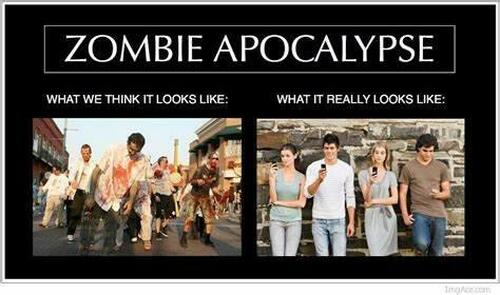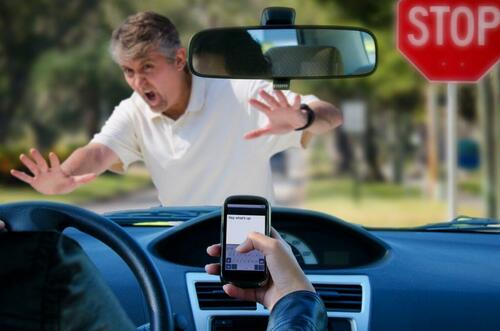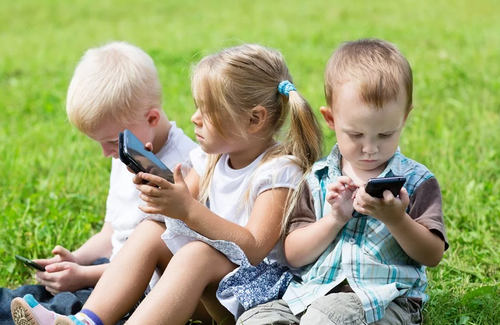
Authored by Bruce Wilds via the Advancing Time Blog,
The smartphone has begun to play a huge role In dumbing down America. Rather than being a source to move us forward, it has become an albatross around the necks of many weak-minded souls that depend on them. People turn to these devices for all kinds of unneeded updates including performing simple math problems so they don't have to think.
Originated in 1933, the term "dumbing down" was movie-business slang, used by screenplay writers, meaning: "to revise to appeal to those of little education or intelligence." For those with little drive or purpose, the tendency to seek distraction and relief from unpleasant realities, especially by seeking entertainment or engaging in fantasy find great comfort in the constant flow of dribble a cell phone can provide. In short, dumbing down is the deliberate oversimplification of intellectual content in education, literature, cinema, news, video games, and culture.
It should be noted this is being written just as the world is on the cusp of being offered a whole new recipe that may lead to more social dysfunction. That comes in the form of "virtual reality" which offers an even stronger form of escapism that may result in damaging the ability of people to relate to each other in the real world. Especially worrisome is the effect it might have on children that experience and embrace it. Their ability to separate this fake virtual world from reality could become impaired.
A great deal of the problems with smartphones are rooted in the idea everyone deserves one. Yes, I said deserves, not needs. Smartphones are now considered by many people as an extension of their being. A government program started years ago has mushroomed in size and transfers a huge amount of wealth down the social ladder. Years ago I wrote an article that outlined a government program supplying free phones to people with low incomes or that have been declared needy. At that time these phones have become known as "Obama Phones." Below I give some of the details about the program including who qualifies. If you want to be popular with the voters give them free stuff and let them know that they should not bite the hand that feeds them.
So who qualifies? It appears little has changed over the years, it seems that if you or members of your household are, receiving the following benefits you automatically qualify for the Lifeline program. The best way to know if you qualify is by filling out an application for a Lifeline provider in your state. Those interested in the program must have an income of less than 135% of the Federal Poverty Guidelines or about $22,350 per year for a family of four.
-
Food Stamps or Supplemental Nutrition Assistance Program (SNAP)
-
Medicaid
-
Supplemental Security Income – commonly known as SSI
-
Health Benefit Coverage under Child Health Insurance Plan (CHIP)
-
The National School Lunch Program’s Free Lunch Program.
-
Low-Income Energy Assistance Program – LIHEAP
-
Federal Public Housing Assistance ( Section 8 )
-
If you are a low-income Eligible Resident of Tribal Lands
-
Temporary Assistance to Needy Families – TANF
It is written that if you are one of those people who have lost their jobs due to the recession, then probably you’re having a hard time with your daily expenses. On top of that, paying telephone bills is just another pressure. You can get rid of this burden by applying to the "Lifeline Assistance Program" run by the government. To get a phone contact the provider of this service. The government has approved many companies at the national and regional levels to provide this service to eligible people.
-
An employer can more easily reach you with a job offer if you have a free government cell phone.
-
You can stay in touch with your doctor and other emergency medical professionals more easily with a free government cell phone.
-
A free government cell phone can help you keep in touch with family and other loved ones.
And the good news is that while a government-assisted cell phone provides you with up to 250 monthly minutes to go with your free cell phone. While that’s a generous contribution from the government, it’s barely enough airtime to last many people a month. But good news is they can easily buy more minutes for the phone from each of the major Lifeline cell phone companies. You can see this is what has happened when it has gotten to the point where people carry their phone in their hand as they go about their business. Apparently, if you use a promotion code, you can get some very good deals.
Interestingly while many people admit they are addicted to these phones that seem to offer a form of escapism from the real world, some users are moving back to dumbphones. A video by ColdFusion (https://www.youtube.com/watch?v=02mIRnPJm6g), an Australian-based online media company, looks into this "Anti-Smartphone Revolution." It points out how the dumbphone or what is sometimes called a brick is far less intrusive in our lives. Surprisingly, it is those users between the age of 25-35 that are leading this charge.
We should never underestimate the role of the smartphone in dumbing down America. We can only hope people will begin to take a closer look at these society-changing devices. When a phone will provide the answer to simple math problems many people no longer feel compelled to learn or memorize the things which give us perspective and help us to understand the world around us. It has become apparent, that smartphones change more than society. They change people, too. Being able to push a few buttons does not necessarily make you smarter.
Authored by Bruce Wilds via the Advancing Time Blog,
The smartphone has begun to play a huge role In dumbing down America. Rather than being a source to move us forward, it has become an albatross around the necks of many weak-minded souls that depend on them. People turn to these devices for all kinds of unneeded updates including performing simple math problems so they don’t have to think.
Originated in 1933, the term “dumbing down” was movie-business slang, used by screenplay writers, meaning: “to revise to appeal to those of little education or intelligence.” For those with little drive or purpose, the tendency to seek distraction and relief from unpleasant realities, especially by seeking entertainment or engaging in fantasy find great comfort in the constant flow of dribble a cell phone can provide. In short, dumbing down is the deliberate oversimplification of intellectual content in education, literature, cinema, news, video games, and culture.
It should be noted this is being written just as the world is on the cusp of being offered a whole new recipe that may lead to more social dysfunction. That comes in the form of “virtual reality” which offers an even stronger form of escapism that may result in damaging the ability of people to relate to each other in the real world. Especially worrisome is the effect it might have on children that experience and embrace it. Their ability to separate this fake virtual world from reality could become impaired.
A great deal of the problems with smartphones are rooted in the idea everyone deserves one. Yes, I said deserves, not needs. Smartphones are now considered by many people as an extension of their being. A government program started years ago has mushroomed in size and transfers a huge amount of wealth down the social ladder. Years ago I wrote an article that outlined a government program supplying free phones to people with low incomes or that have been declared needy. At that time these phones have become known as “Obama Phones.” Below I give some of the details about the program including who qualifies. If you want to be popular with the voters give them free stuff and let them know that they should not bite the hand that feeds them.
So who qualifies? It appears little has changed over the years, it seems that if you or members of your household are, receiving the following benefits you automatically qualify for the Lifeline program. The best way to know if you qualify is by filling out an application for a Lifeline provider in your state. Those interested in the program must have an income of less than 135% of the Federal Poverty Guidelines or about $22,350 per year for a family of four.
-
Food Stamps or Supplemental Nutrition Assistance Program (SNAP)
-
Medicaid
-
Supplemental Security Income – commonly known as SSI
-
Health Benefit Coverage under Child Health Insurance Plan (CHIP)
-
The National School Lunch Program’s Free Lunch Program.
-
Low-Income Energy Assistance Program – LIHEAP
-
Federal Public Housing Assistance ( Section 8 )
-
If you are a low-income Eligible Resident of Tribal Lands
-
Temporary Assistance to Needy Families – TANF
Lifeline is a government-sponsored program, but who is paying for it? Some people claim that the government is using taxpayers’ money to run this program, however, the claim is false. The clever clowns we have sent to Washington found a backhanded under-the-table sort of way to make it appear it is not taxpayer money. Universal Service Fund (USF) which is administered by the Federal Communication Commission along with the Universal Service Administration Company (USAC), pays for the Lifeline phone assistance program. The Universal Service Fund (USF) was created back in 1997 by Federal Communication Commission to achieve the goals set by Congress under the Telecommunication Act of 1996. According to the Act, service providers are obliged to contribute a portion of their interstate and international telecommunications revenues. In short, paying phone customers are paying for it.
It is written that if you are one of those people who have lost their jobs due to the recession, then probably you’re having a hard time with your daily expenses. On top of that, paying telephone bills is just another pressure. You can get rid of this burden by applying to the “Lifeline Assistance Program” run by the government. To get a phone contact the provider of this service. The government has approved many companies at the national and regional levels to provide this service to eligible people.
-
An employer can more easily reach you with a job offer if you have a free government cell phone.
-
You can stay in touch with your doctor and other emergency medical professionals more easily with a free government cell phone.
-
A free government cell phone can help you keep in touch with family and other loved ones.
And the good news is that while a government-assisted cell phone provides you with up to 250 monthly minutes to go with your free cell phone. While that’s a generous contribution from the government, it’s barely enough airtime to last many people a month. But good news is they can easily buy more minutes for the phone from each of the major Lifeline cell phone companies. You can see this is what has happened when it has gotten to the point where people carry their phone in their hand as they go about their business. Apparently, if you use a promotion code, you can get some very good deals.
A great deal of attention has been given to some of the ideas and visions the World Economic Forum has floated. A powerful and very visible glimpse was contained in the public relations video entitled: “8 Predictions for the World in 2030. Its 2030 agenda promotes the idea that by 2030, “You will own nothing. And you’ll be happy.” Smartphones dovetail with edging the general population towards such an existence. With the government transferring the costs for millions of customers to those that pay full price, another face of corporate welfare is exposed.
Over The Years This Addiction Has Only Grown Stronger
Interestingly while many people admit they are addicted to these phones that seem to offer a form of escapism from the real world, some users are moving back to dumbphones. A video by ColdFusion (https://www.youtube.com/watch?v=02mIRnPJm6g), an Australian-based online media company, looks into this “Anti-Smartphone Revolution.” It points out how the dumbphone or what is sometimes called a brick is far less intrusive in our lives. Surprisingly, it is those users between the age of 25-35 that are leading this charge.
We should never underestimate the role of the smartphone in dumbing down America. We can only hope people will begin to take a closer look at these society-changing devices. When a phone will provide the answer to simple math problems many people no longer feel compelled to learn or memorize the things which give us perspective and help us to understand the world around us. It has become apparent, that smartphones change more than society. They change people, too. Being able to push a few buttons does not necessarily make you smarter.







